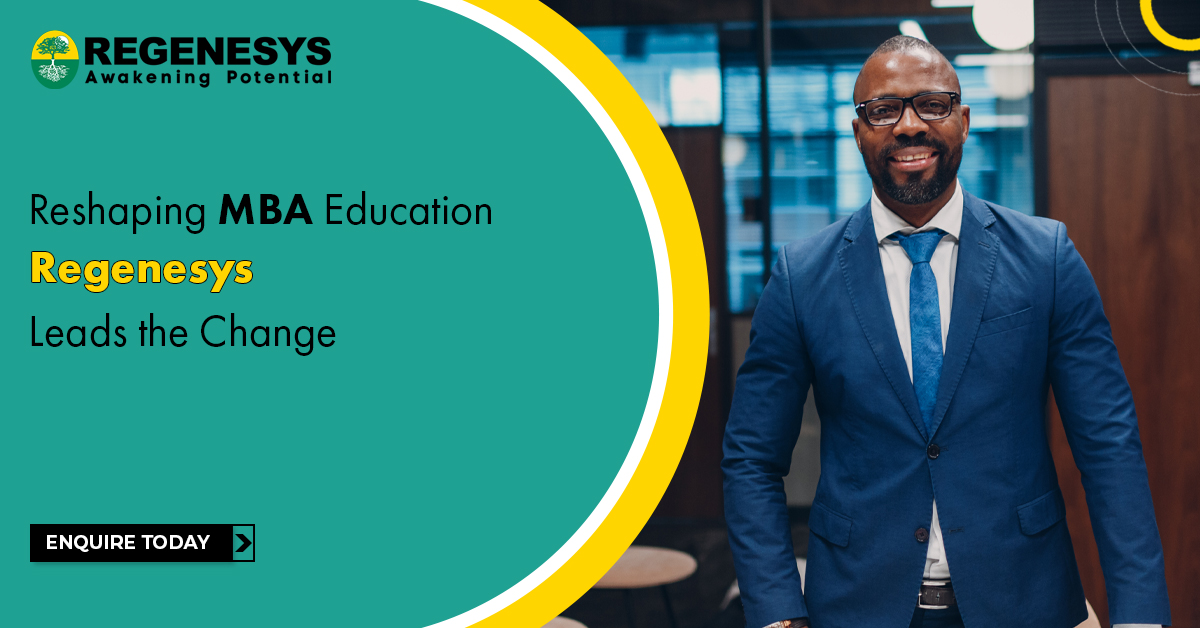The pandemic brought a seismic shift across industries, and the world of education wasn’t spared. Masters in Business Administration (MBA) programme, including those in South Africa, faced unprecedented challenges due to COVID-19. The MBA landscape transformed rapidly, influencing admissions, modes of learning, and the overall MBA experience.
Table of Contents
Evolution of MBA Admissions during COVID-19:
MBA institutes in South Africa and around the world restructured their admission processes in response to the pandemic. Traditional criteria like GMAT scores and work experience saw alterations. But to be admitted to Regenesys, you must appear for the RMAT (Regenesys Management Aptitude Test). Many programmes extended deadlines, relaxed testing requirements, and focused more on candidate assessment due to test cancellations and restrictions. These adjustments accommodated applicants’ challenges, ensuring a fairer evaluation process.
Transition to Online Learning:
The pandemic accelerated the shift to online education, impacting MBA programmes significantly. Universities worldwide swiftly adopted remote learning models, including MBA programmes, to ensure continuity. This shift to an online MBA was a substantial adjustment, offering challenges and opportunities. While it enabled flexibility and widened accessibility, it demanded adaptation to virtual classrooms and altered networking dynamics.
Reshaping Postgraduate Programmes:
Masters in Business Administration programmes underwent restructuring to cater to the evolving business landscape. COVID-19 emphasised the need for agile and adaptable leaders. Curriculums began integrating modules addressing crisis management, digital transformation, and remote team leadership. This alteration in content aimed to equip future business leaders with skills crucial in navigating uncertain and changing environments.
Adapting the What is MBA Experience:
The essence of MBA programmes transformed amid the pandemic. Networking events, internships, and experiential learning faced disruptions, prompting institutions to innovate. Virtual networking sessions, remote internships, and immersive online experiences emerged to compensate for the limitations imposed by travel restrictions and social distancing norms. These adaptations redefined the ‘What is MBA’ experience, emphasising resilience and adaptability.
Regenesys Business School
Regenesys Business School is an institute of progressive education renowned for its innovative approach and commitment to fostering transformative leaders. With a global footprint and a dedication to accessible quality education, Regenesys offers a diverse range of programmes designed to empower individuals and organisations alike. Their ethos revolves around holistic learning, integrating traditional business acumen with contemporary insights, ensuring graduates are equipped with theoretical knowledge and practical skills that meet the demands of a dynamic business landscape. By emphasising innovation, ethics, and a strong focus on personal development, Regenesys Business School nurtures a community of forward-thinking individuals ready to impact the world of business and beyond profoundly.
Regenesys Business School’s Master of Business Administration (MBA) Programme stands out amidst this transformative landscape. With a focus on holistic learning and real-world applicability, Regenesys offers a dynamic MBA experience that incorporates global best practices and local relevance. Regenesys also offers an online MBA programme for those with busy lifestyles and priorities. Explore Regenesys’ MBA Programme on their website: Regenesys MBA Programme.
Core Modules:
- Business Research Management: Understanding and applying research methodologies in business decision-making and problem-solving.
- Economics: Analysis of market forces, economic policies, and their impact on business operations and strategies.
- Emotional and Spiritual Intelligence: Developing self-awareness, empathy, and ethical decision-making for effective leadership and personal growth.
- Entrepreneurship: Studying the creation, development, and management of new ventures and innovative business ideas.
- Innovation: Exploring creative processes, disruptive technologies, and strategies for fostering organisational innovation.
- Operations and Supply Chain Management: Managing and optimising processes, logistics, and supply chains for efficiency and competitive advantage.
- Strategic Human Resource Management: Aligning HR practices with organisational strategies to enhance performance and employee satisfaction.
- Strategic Financial Management: Decision-making and management of financial resources to achieve organisational objectives.
- Strategic Management: Crafting and implementing long-term plans and strategies to achieve competitive advantage and organisational goals.
- Strategic Marketing Management: Developing and executing marketing strategies to meet organisational objectives and customer needs.
Conclusion:
The COVID-19 pandemic undeniably reshaped the landscape of MBA programmes globally and specifically within South Africa. The shift towards online learning, restructured admissions, and the recalibration of postgraduate programmes reflect the adaptability of institutions and the resilience of aspiring business leaders. As we navigate these changes, the future of MBA education promises a blend of traditional rigour and modern flexibility.
Readers, what has been your experience with MBA programmes during the pandemic? How do you perceive the shift to online learning and the adaptations made by institutions? Share your thoughts below!
FAQs
1: How has COVID-19 affected MBA admissions?
COVID-19 prompted MBA programmes to adapt admission criteria, extend deadlines, relax testing requirements, and focus more on holistic candidate assessment due to test cancellations and restrictions.
2: What changes have occurred in MBA learning due to the pandemic?
The pandemic accelerated the shift to online learning, leading to a rapid adoption of remote education models, including MBA programmes, which offered both challenges and opportunities regarding flexibility and accessibility.
3: Have MBA programmes adapted their content due to COVID-19?
MBA programmes have reshaped their content to include crisis management, digital transformation, and remote team leadership modules to equip future business leaders with skills essential for navigating uncertain environments.
4: How did the pandemic impact the traditional MBA experience?
Networking events, internships, and experiential learning were disrupted. Institutions innovated with virtual networking sessions, remote internships, and immersive online experiences to compensate for limitations imposed by travel restrictions and social distancing norms.
5: What core modules are typically covered in an MBA programme?
Core modules often include Business Research Management, Economics, Emotional and Spiritual Intelligence, Entrepreneurship, Innovation, Operations and Supply Chain Management, Strategic Human Resource Management, Strategic Financial Management, Strategic Management, and Strategic Marketing Management.
6: What makes Regenesys Business School’s MBA Programme unique?
Regenesys Business School offers a dynamic MBA experience focusing on holistic learning, real-world applicability, global best practices, and local relevance. It stands out for its commitment to fostering transformative leaders in a rapidly changing business landscape.







